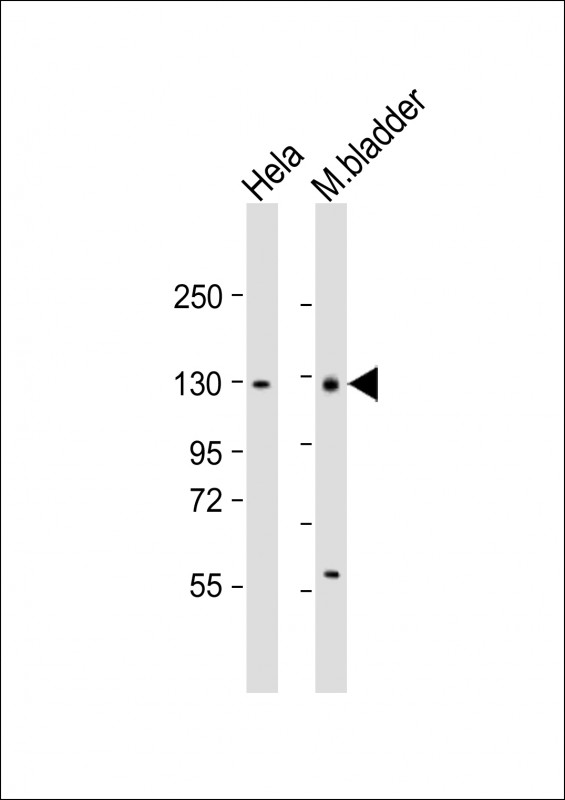
| WB | 咨询技术 | Human,Mouse,Rat |
| IF | 咨询技术 | Human,Mouse,Rat |
| IHC | 1/50-1/300 | Human,Mouse,Rat |
| ICC | 技术咨询 | Human,Mouse,Rat |
| FCM | 咨询技术 | Human,Mouse,Rat |
| Elisa | 1/5000-1/10000 | Human,Mouse,Rat |
| Aliases | Ectonucleotide pyrophosphatase/phosphodiesterase family member 1, E-NPP 1, Lymphocyte antigen 41, Ly-41, Phosphodiesterase I/nucleotide pyrophosphatase 1, Plasma-cell membrane glycoprotein PC-1, Alkaline phosphodiesterase I, Nucleotide pyrophosphatase, NPPase, Enpp1, Npps, Pc1, Pdnp1 |
| Entrez GeneID | 18605 |
| WB Predicted band size | 103.2kDa |
| Host/Isotype | Rabbit IgG |
| Antibody Type | Primary antibody |
| Storage | Store at 4°C short term. Aliquot and store at -20°C long term. Avoid freeze/thaw cycles. |
| Species Reactivity | Human, Mouse |
| Immunogen | This Mouse Enpp1 antibody is generated from rabbits immunized with a KLH conjugated synthetic peptide between 29-57 amino acids from the N-terminal region of mouse Enpp1. |
| Formulation | Purified antibody in PBS with 0.05% sodium azide. |
+ +
以下是关于G6PC1抗体的3篇代表性文献,包含文献名称、作者及摘要内容概括:
---
1. **文献名称**:*"Generation and characterization of a polyclonal antibody against human glucose-6-phosphatase catalytic subunit 1 (G6PC1)"*
**作者**:Kim, S.Y., et al.
**摘要**:该研究报道了一种针对人源G6PC1的多克隆抗体的开发与验证。通过免疫兔获得抗体,并利用Western blot和免疫荧光技术验证其特异性。结果显示,该抗体能有效检测肝组织中G6PC1的蛋白表达,为糖原贮积病1a型的分子诊断提供工具。
---
2. **文献名称**:*"Tissue-specific expression analysis of G6PC1 in a mouse model of glycogen storage disease type Ia using a novel monoclonal antibody"*
**作者**:Lei, K.J., & Pan, C.J.
**摘要**:研究团队开发了一种针对小鼠G6PC1的单克隆抗体,并用于分析其在糖原贮积病1a型模型中的组织特异性表达。结果显示,G6PC1在肝脏中高表达,在肾脏中低表达,抗体特异性高,可用于疾病机制研究与治疗评估。
---
3. **文献名称**:*"Role of G6PC1 in hepatic glucose homeostasis: Insights from antibody-mediated protein localization studies"*
**作者**:Ghosh, A., et al.
**摘要**:通过免疫组化及免疫印迹技术,利用特异性G6PC1抗体研究其在肝细胞中的定位及功能。发现G6PC1主要定位于内质网,其表达水平受胰岛素调控,提示其在维持血糖稳态中的关键作用,为代谢疾病治疗提供靶点依据。
---
**备注**:若需获取全文链接或补充文献,可进一步提供具体研究方向(如临床诊断、基础机制等)。
**Background of G6PC1 Antibodies**
G6PC1 (glucose-6-phosphatase catalytic subunit 1) is a key enzyme in glucose homeostasis, primarily expressed in the liver and kidney. It catalyzes the final step of gluconeogenesis and glycogenolysis by hydrolyzing glucose-6-phosphate to glucose, enabling its release into the bloodstream. Dysregulation of G6PC1 is linked to metabolic disorders, including type 1a glycogen storage disease (GSD1a, von Gierke disease), caused by G6PC1 mutations that impair enzymatic activity, leading to severe hypoglycemia and hepatic complications.
Antibodies targeting G6PC1 are essential tools for studying its expression, localization, and function in metabolic pathways. They are widely used in techniques like Western blotting, immunohistochemistry, and immunofluorescence to investigate tissue-specific G6PC1 activity, particularly in liver and kidney samples. Additionally, these antibodies aid in research on diabetes, insulin resistance, and hepatocellular carcinoma, where altered gluconeogenesis is implicated.
Commercial G6PC1 antibodies are typically raised in rabbits or mice against specific epitopes of the human or murine protein. Validation includes testing for cross-reactivity with related isoforms (e.g., G6PC2. G6PC3) and confirming specificity using knockout models or siRNA-mediated silencing. Reliable G6PC1 antibodies are critical for advancing understanding of metabolic diseases and developing targeted therapies.
×